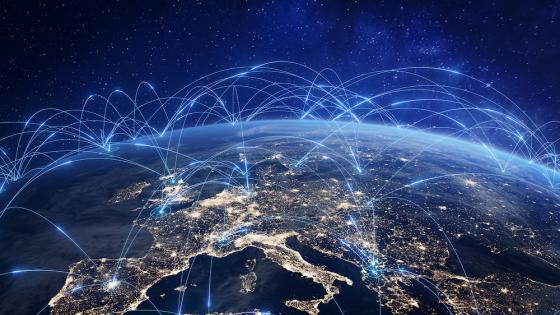We live in an unprecedented age of globalisation, where technology, ideas, factors of production, and goods are increasingly mobile across national boundaries. But globalisation is neither inevitable nor irreversible – it is a policy choice. The last era of globalisation was brought to an end by the combined disorder of international conflicts and the Great Depression (James 2001, Findlay and O’Rourke 2007, 2008).
In recent research (Acemoglu and Yared 2010), we examine the political limits to globalisation in the modern era. We explore the claim that changes in domestic political factors might restrict international economic integration by examining the relationship between militarism and international trade flows. The evidence suggests that increased nationalist and militarist sentiments, measured by military spending and size, are negatively associated with trade. A country is less likely to open up to neighbours if the country is also becoming more militarised, and trade between two countries grows less rapidly when both countries become more militarised.
Militarism and trade, 1985–2005
Despite the increasing reach of globalisation, anecdotal evidence suggests that nationalism and militarism remain resilient. Figure 1 shows the evolution of world trade and total military spending since the closing of the Cold War. After declining for a number of years, military spending began climbing from the mid-1990s onwards, suggesting that nationalist sentiments and militarism may indeed be strengthening.
Figure 1. World trade and militarisation, 1988–2007
Notes: Trade share of GDP is average across countries for each year. Military spending is the sum across countries, in 1996 dollars. See Acemoglu and Yared (2010) for details and sources.
Does this trend in military spending suggest a potential threat to international trade? The evidence suggests some reasons for concern. First, between 1985 and 2005, countries that expanded their militaries faster experienced a relative decline in their volume of trade. Second, over the same period, trade between two countries grew less rapidly the more those countries invested in their military.
The first piece of evidence comes from the relationship between the change in a country’s trade share of GDP and its change in militarisation – proxied by log military spending. Regressions, also controlling for log GDP per capita and log population, indicate that a 10% increase in military spending over the two decades is associated with a reduction in the trade share of GDP of approximately 1.8%. Figure 2 demonstrates this strong negative relationship in a residual plot of the change in trade share against the change in military spending.
Figure 2. Change in trade and militarisation, 1988–2005
Source: Plot corresponds to the regression in column 1 of panel A of Table 1 in Acemoglu and Yared (2010).
These results are robust to measuring military size by personnel instead of spending, excluding Asian countries, and allowing for a differential trend between OECD and non-OECD countries. Moreover, the estimated effect is stronger once we exclude countries that were engaged in civil or international wars, which suggests that our results are capturing the relationship between trade and militarism, not the relationship between trade and disruptions due to war. Overall, the cross-country evidence shows a relatively robust association between changes in militarisation and changes in international trade between 1985 and 2005.
The relationship between militarism and bilateral trade is also consistent with these patterns. A regression of the change in a country’s trade with its partner as a share of its own GDP on the change in the interaction of the two countries’ military expansion shows a negative relationship. This approach of exploiting bilateral trade flows is attractive because it allows the inclusion of a rich set of controls for various differential trends, in particular by including a full set of country and partner fixed effects and other interactions.
Conclusion
International trade and international relations are deeply intertwined. Previous studies have examined the relationship between trade flows and armed conflicts, demonstrating how war disrupts trade and increased integration lessens the probability of conflict arising (Martin, Mayer, and Thoenig 2007, 2008). This column presents evidence that increased nationalism and militarism may constitute political limits to globalisation and trade even in the absence of outright conflict.
Of course, it is unclear to what extent these empirical patterns reflect causality, since trade may also affect militarisation, and the two may be related to an underlying third factor. In addition, the causes of the apparent rise in nationalism and militarisation during the last two decades are unclear and require further research. Nevertheless, these trends suggest that there are always dangers for some dimensions of globalisation to run into political limits.
References
Acemoglu, Daron and Pierre Yared (2010), “Political Limits to Globalization”, NBER Working Paper 15694, January.
Findlay, Ronald and Kevin O’Rourke (2007), Power and Plenty: Trade, War, and the World Economy in the Second Millennium, Princeton: Princeton University Press.
Findlay, Ronald and Kevin O’Rourke (2008), “Lessons of 1000 years of trade history”, VoxEU.org, 10 March.
James, Harold (2001), The End of Globalization: Lessons from the Great Depression, Cambridge: Harvard University Press.
Martin, Philippe Thierry Mayer and Mathias Thoenig (2007), “Trade and/or War?” VoxEU.org, 4 July.
Martin, Philippe Thierry Mayer and Mathias Thoenig (2008), “Make Trade Not War?” Review of Economic Studies, 75(3): 865-9




